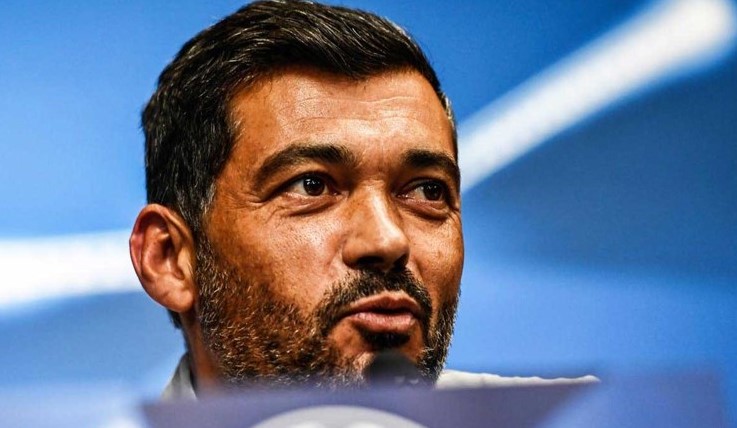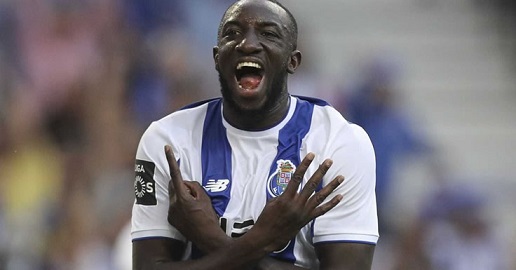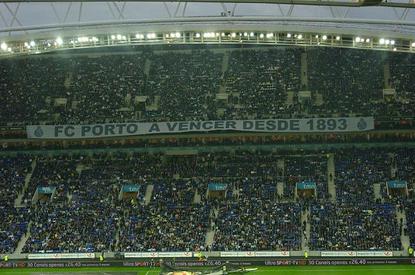 FC Porto were crowned champions of Portugal on Saturday evening after the Lisbon derby ended in a draw. Immediately after the final whistle had blown at Alvalade, the party started 300km to the north, and will continue long into the night on Porto’s Avenida dos Aliados.
FC Porto were crowned champions of Portugal on Saturday evening after the Lisbon derby ended in a draw. Immediately after the final whistle had blown at Alvalade, the party started 300km to the north, and will continue long into the night on Porto’s Avenida dos Aliados.
The celebrations will be especially effusive this year after four seasons without winning Portuguese football’s biggest prize, or indeed any silverware, in stark contrast to the previous three decades of almost unbroken hegemony by the Blue and Whites. How did Porto bounce back?
PortuGOAL elaborates on the one huge reason, and three others that help explain why Porto are back at the top of the tree in Portugal.
Sérgio Conceição
The person most responsible for ending Porto’s lengthy trophy drought is coach Sérgio Conceição. He got the chance to coach the club where he made his name as a brilliant winger after steadily working his way up the managerial ladder at a series of Portugal’s more modest clubs, then at Nantes in France, doing an impressive job at every port of call.
He walked into a club in unpromising circumstances. Several coaches had failed to arrest Porto’s slide, and with most of them going on to impress in their next jobs – Julen Lopetegui, Paulo Fonseca, Luis Castro, Nuno Espírito Santo – it appeared the deep-rooted problems at the club went far beyond whoever was sitting in the dugout. Moreover, UEFA’s financial fair play rules had bitten hard on the club, forcing the Dragons to sell star striker André Silva and forbidding them from spending in the transfer market.
Yet even in pre-season, Conceição’s motivational skills and reinvigorating effect were plain to see. Unable to dip into the transfer market, the coach recalled several Porto players who had been farmed out on loan, with Vincent Aboubakar, Ricardo Pereira and Moussa Marega all proceeding to have the best season of their careers under Conceição’s tutelage. His ability to coax the best out of underperforming footballers was further exemplified by midfield duo Héctor Herrera and Sérgio Oliveira, who had done little in the previous four years to suggest they could be key members of successful a title quest.
Known as a fiery character, Conceição was not afraid to wield his power and show who was boss when need be, his surprise dropping of Casillas and the public rebuke given to Tiquinho Soares prime examples. Rather than divide the squad however, these episodes showed that nothing less than 100% commitment to the cause at all times would be tolerated, a message the players fully bought into.
And while the unsmiling Conceição bears the hallmarks of a tough taskmaster, one of the key components of Porto’s success in 2017/18 is undoubtedly the spirit of togetherness that the 43-year-old managed to foster. When things went wrong he refused to criticise his players, insisting the responsibility for poor results was first and foremost his own, as the leader, going as far as to openly admit he got his tactics wrong.
Beyond the words, his actions also demonstrated he was willing to admit it when he had made a mistake, as shown by his reinstating of Casillas. His demeanour was constantly positive, never hiding behind injuries or the fixture pile-up as excuses for setbacks. The most visible facet of his efforts to unite the squad throughout the campaign was the ritual gathering of the whole team in a huddle for a pep-talk on the pitch, in full view of the fans, at the final whistle after every match, win lose or draw.
While his motivational powers are a big part of his managerial skillset, Conceição has also shown himself to be an astute and flexible tactical thinker, using a number of players in surprising positions (e.g. Ricardo at right-back and right winger, Miguel Layún as a central midfielder, centre-back Diego Reyes in midfield, Marega as a No.9 or as a powerful winger), and switching between 442 and 433 and variations thereof depending on the opposition and the players he had available.
In short, it is difficult to imagine Conceição (or anyone in truth) doing better given the recent history of the club and the limited resources at his disposal. If Porto want to consolidate their position at the top of the Portuguese football tree, tying down their coach to a long-term contract would appear advisable.
 The vengeance of Moussa Marega
The vengeance of Moussa Marega
When he made his move from Marítimo to Porto in January 2016, the Malian striker had a torrid six months. Widely ridiculed as he struggled in an underperforming team, the clumsy-looking forward was quickly dispatched to Vitória Guimarães on loan, with most observers thinking he would never wear a Porto shirt again. Marega deserves credit for refusing to accept his failure was anything more than a temporary setback, doing very well at the Dom Afonso Henriques in 2016/17.
Nevertheless, at the start of the season the general opinion was that he was benefiting from a second chance at Porto only because the club were prohibited from entering the transfer market, rather than his own merits. Twenty-three goals later and nobody doubts Marega is worthy of wearing the Porto shirt. What he lacks in technique he more than makes up for in a potent mix of strength, speed and determination that has seen him terrorise defences up and down Portugal all season. It was fitting that it was Marega who scored the goal against his former club Marítimo in Madeira last weekend that all but sealed the title for the Dragons.
 Fans all aboard – through thick and thin
Fans all aboard – through thick and thin
A remarkable thing happened at around 9.30pm at the Estádio do Dragão on 14 February 2018. Porto had just been thumped 5-0 by Liverpool in the Champions League – their biggest home defeat in their entire history, in all competitions. How did the fans react to the humiliation? By giving the players a rousing send-off, chanting “Eu quero o Porto campeão!” in unison.
A similar reaction was evident in Lisbon after Porto had lost to Belenenses in April and had seemingly thrown away the championship. As the coach and players have made a point of saying all season, the fans’ unstinting backing has been crucial in fortifying belief around the club that this year it would be different. A home record of 15-1-0 with 50 goals scored shows just how comfortable the team are playing in front of their own supporters.
Kings of the Clássicos
Porto did not lose any of their four matches against title rivals Benfica and Sporting, beating each team once and drawing the reverse fixture (as well as beating Braga home and away). The victory over Sporting at the Dragão in March effectively knocked the Lions out of the race, while the recent win against Benfica in front of a 60,000 crowd at the Estádio da Luz, most of whom were raucously cheering for the home side, was the key result of the 2017/18 championship race.
By Tom Kundert